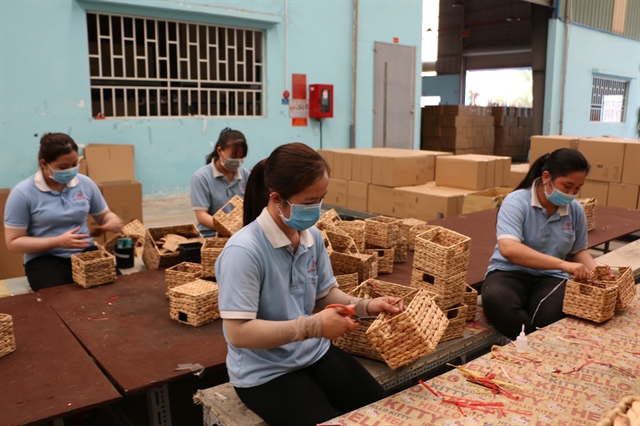 Society
Society

The Việt Nam General Confederation of Labour (VGCL) has proposed the National Wages Council adjust the regional minimum wage to meet workers’ and the labour market’s demand.

|
| Workers of the Hòa Thành Co Ltd in Bến Lức District, in the southern province of Long An, at work. An increase in the regional minimum wage is the desire of many workers like this, in the context of COVID-19 and its impacts. — VNA/VNS Photo Thanh Bình |
HÀ NỘI — The Việt Nam General Confederation of Labour (VGCL) has proposed the National Wages Council adjust the regional minimum wage to meet workers’ and the labour market’s demand.
Due to the COVID-19 pandemic over the past two years, the regional minimum wage has not been adjusted. It is still based on the Decree 90/2019/NĐ-CP of the Government, starting January 1, 2020.
Workers meet difficulties
Lê Đình Quảng, deputy head of the Policy and Law Department under the VGCL and also a member of the National Wages Council, said that from 2016 to 2020, the average annual adjustment is 7.4 per cent.
For quite a long time, the minimum wage has not been adjusted, so it no longer "ensures the minimum standard of living of workers and their families", and is no longer a protective measure for workers, he said.
“Enterprises often follow the Government’s annual minimum wage regulations to adjust their actual salary. During the past two years, the minimum wage has not been adjusted, so many enterprises rely on it without adjusting wages. With the COVID-19 pandemic, workers faced many difficulties when consumer prices increased leading to many spontaneous strikes early this year," Quảng said.
Quảng added that the definition of minimum wage was the lowest level to pay workers for the simplest jobs, but must ensure a minimum standard of living for them and their families. Now, among seven factors that are considered the basis for adjusting the minimum wage, many factors have changed drastically such as the consumer price index (CPI), the minimum standard of living for employees and their families and the growth rate economy.
Quảng said that normally the minimum wage is usually adjusted at the beginning of the year, but in the present difficult context, it is still possible to adjust before the above milestone, because it has not been increased for so long.
Moreover, he said, the pandemic situation has had positive developments. In addition, in history, many times the minimum wage was adjusted and applied in the middle of the year, so he personally still wants to adjust the regional minimum wage early, to apply for the last six months of this year and next year.
Hoàng Quang Phòng, deputy chairman of Việt Nam Chamber of Commerce and Industry (VCCI), said that at present, enterprises were focusing on production recovery after COVID-19.
A salary increase for workers is a legitimate aspiration, but the increase needed to be carefully calculated, he said.
On April 15, the Ministry of Labour, Invalids and Social Affairs will conduct a survey of enterprises on labour issues, wages and minimum living standards. The results will be used as a basis for developing content on regional minimum wages next year and related policies.
After the survey, the concerned agency will clarify more about the regional minimum wage adjustment, he said.
On August 5, 2020, at a meeting in Hà Nội, Deputy Minister of Labour, Invalids and Social Affairs and Chairman of the National Wages Council Lê Văn Thanh declared that the region-based minimum wage would not be adjusted in 2021.
The minimum wage for workers in Region 1, which covers Hà Nội and HCM City’s urban areas, is set to maintain at VNĐ4.42 million (US$191.39). Region 2, covering Hà Nội and HCM City’s rural areas, along with major urban areas in the country like Cần Thơ, Đà Nẵng and Hải Phòng, will be VNĐ3.92 million.
Those in Region 3, or provincial cities and the districts of Bắc Ninh, Bắc Giang and Hải Dương provinces, will earn at least VNĐ3.43 million a month, while Region 4, or the rest of the country, will receive a minimum of VNĐ3.07 million.
More shifts
With a basic salary of VNĐ4.1 million ($179) per month, plus allowances, the income of Phạm Thị Dịu, a worker in Nếnh Town in Việt Yên District, the northern province of Bắc Giang, is about VNĐ5 million.
Her husband works as a gardener in the hometown without a stable income, so the family's living expenses depend on her salary.
To have money to send to her hometown to feed her children, Dịu has to work hard overtime and work more shifts to have about two million đồng more.
Nguyễn Đức Sinh, chairman of the Trade Union of Phú Thọ Province Industrial Zones, said that in the past two years, the lack of increase in the minimum wage has affected the lives of workers.
Sinh believes that in the context of rising prices, especially petrol prices, workers really want an increase in wages to alleviate some of the difficulties.
Talking about the issue, Nguyễn Thị Lan Hương, former director of the Institute of Social Sciences under the Ministry of Labour, Invalids and Social Affairs, said that in theory, the minimum wage was adjusted based on the minimum living standards of workers and their families, consumer price index, economic growth rate and enterprise affordability.
This year, Việt Nam prioritises supporting enterprises to recover and create sustainable jobs for workers. After the economy recovers, the regional minimum wage increase will be calculated. — VNS




